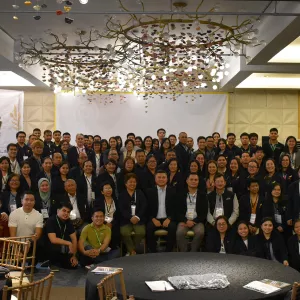Collaborative efforts on advancing biological control agents in Philippine agriculture
Baguio City, Philippines (May 27 to 31, 2024) – Agricultural experts convened for a week to explore innovative solutions for sustainable pest management. The workshop, co-organized by the Department of Agriculture (DA), the International Rice Research Institute (IRRI), and the Philippines Rice Research Institute (PhilRice), brought together 105 participants from various sectors to delve into advancing the potential of Biological

Collaborative efforts on advancing biological control agents in Philippine agriculture
Baguio City, Philippines (May 27 to 31, 2024) – Agricultural experts convened for a week to explore innovative solutions for sustainable pest management. The workshop, co-organized by the Department of Agriculture (DA), the International Rice Research Institute (IRRI), and the Philippines Rice Research Institute (PhilRice), brought together 105 participants from various sectors to delve into advancing the potential of Biological Control Agents (BCAs) as a viable alternative to harmful pesticides.
The event was inaugurated by key figures in the agricultural sector such as Dr. Gerald Glenn F. Panganiban, the Director of DA – Bureau of Plant Industry (BPI) and Dr. Peter M. Magdaraog, the Division Chief of Crop Pest Management Division, DA-BPI, underscoring the government’s commitment to promoting eco-friendly farming practices. Dr. Dirk Babendreier, an international expert, shared valuable insights on the production of Trichogramma – a beneficial insect used in biological control – in the region.

Presenters and attendees included representatives from BPI, Regional Crop Protection Centers, PhilRice, Bureau of Agricultural Research, National Crop Protection Center of the University of the Philippines Los Baños, the private sector, and IRRI.
The workshop aimed to foster collaboration among researchers, BCA producers, farmers, and industry stakeholders to:
- Enhance research and development: Identifying areas for joint research projects and knowledge sharing.
- Standardize protocols: Developing clear guidelines for the safe and effective use of BCAs.
- Optimize production: Improving the efficiency and sustainability of BCA production processes.
- Expand outreach: Increasing awareness and adoption of BCAs among farmers.
- Promote commercialization: Supporting the development of BCA-based products and services.

By working together, participants sought to strengthen the Philippines’ capacity to adopt sustainable pest management practices and protect the environment.
The workshop highlighted the importance of biological control as a cornerstone of sustainable agriculture. By harnessing the power of nature, the Philippines can reduce its reliance on harmful chemicals, protect biodiversity, and ensure food security for future generations.
This workshop was supported by the CGIAR Plant Health Initiative and the ASEAN-CGIAR Innovate for Food and Nutrient Security Regional Program.

